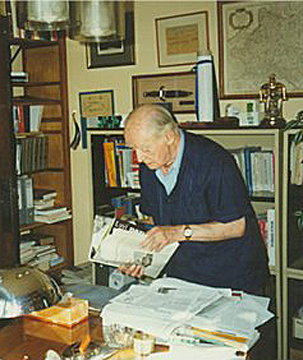|
Giedroyc-Mieroszewski Doctrine
The Giedroyc doctrine (; pl, doktryna Giedroycia) or Giedroyc–Mieroszewski doctrine was a political doctrine that urged reconciliation among Central and Eastern European countries. It was developed by postwar Polish émigrés, and was named for Jerzy Giedroyc, a Polish émigré publicist, with significant contributions by Juliusz Mieroszewski for whom it is also sometimes named. History Giedroyc developed the doctrine in the 1970s in the journal ''Kultura'' with Juliusz Mieroszewski (the doctrine is sometimes called the Giedroyc-Mieroszewski doctrineŽivilė Dambrauskaitė, Tomas Janeliūnas, Vytis Jurkonis, Vytautas Sirijos Gira, Lithuanian – Polish Relations Reconsidered: A Constrained Bilateral Agenda or an Empty Strategic Partnership?' pp. 126–27 online, direct PDF download.) and other émigrés of the "Maisons-Laffitte group".Piotr A. MaciążekSłownik Polityki Wschodniej Polityka Wschodnia, 2011 The doctrine can be traced to the interwar Prometheist project of ... [...More Info...] [...Related Items...] OR: [Wikipedia] [Google] [Baidu] |
Jerzy Giedroyc 1997
Jerzy is the Polish version of the masculine given name George. The most common nickname for Jerzy is Jurek (), which may also be used as an official first name. Occasionally the nickname Jerzyk may be used, which means "swift" in Polish. People *Jerzy, ''nom de guerre'' of Ryszard Białous, Polish World War II resistance fighter * Jerzy Andrzejewski, Polish writer * Jerzy Bartmiński, Polish linguist and ethnologist * Jerzy Braun (other), several people * Jerzy Brzęczek, Polish footballer and manager * Jerzy Buzek, Polish politician and former Prime Minister * Jerzy Dudek, Polish footballer * Jerzy Fedorowicz, Polish actor and theatre director * Jerzy Ficowski, Polish poet and translator * Jerzy Grotowski, Polish theatre director and theorist * Jerzy Hoffman, Polish film director, screenwriter, and producer * Jerzy Jarniewicz, Polish poet, literary critic, translator and essayist * Jerzy Janowicz, Polish tennis player * Jerzy Jurka, Polish-American computational a ... [...More Info...] [...Related Items...] OR: [Wikipedia] [Google] [Baidu] |
Zdzisław Najder
Zdzisław Najder (; 31 October 1930 – 15 February 2021) was a Polish literary historian, critic, and political activist. He was primarily known for his studies on Joseph Conrad, for his periods of service as political adviser to Lech Wałęsa and Jan Olszewski, and for having served as chief of the Polish-language section of Radio Free Europe. Educated in Poland and England, Najder had worked as a professor in Poland and abroad before his exile from Poland in 1981. During most of that exile, he worked for Radio Free Europe. Sentenced to death in absentia in his native land, he did not return to Poland until the overthrow of its communist regime, whereupon he became an active political adviser. Najder's 1983 biography of Conrad, substantially revised in 2007, is regarded as an important work in Conrad scholarship. Life Early life Born in Warsaw, Poland, on 31 October 1930, Najder studied at Warsaw University (1949–1954) and at St Antony's College, Oxford (1959–1969), earn ... [...More Info...] [...Related Items...] OR: [Wikipedia] [Google] [Baidu] |
Territorial Changes Of Poland
Poland is a country in Central Europe bordered by Germany to the west; the Czech Republic and Slovakia to the south; Ukraine, Belarus and Lithuania to the east; and the Baltic Sea and Kaliningrad Oblast, a Russian exclave, to the north. The total area of Poland is , making it the 69th largest country in the world and the ninth largest in Europe. From a nucleus between the Oder and Vistula rivers on the North-Central European Plain, Poland has at its largest extent expanded as far as the Baltic, the Dnieper and the Carpathians, while in periods of weakness it has shrunk drastically or even ceased to exist. Territorial history In 1492, the territory of Poland-Lithuania – not counting the fiefs of Mazovia, Moldavia, and East Prussia – covered , making it the largest territory in Europe; by 1793, it had fallen to , the same size as Great Britain, and in 1795, it disappeared completely. The first 20th-century incarnation of Poland, the Second Polish Republic, occupied , while ... [...More Info...] [...Related Items...] OR: [Wikipedia] [Google] [Baidu] |
Polish Government In Exile
The Polish government-in-exile, officially known as the Government of the Republic of Poland in exile ( pl, Rząd Rzeczypospolitej Polskiej na uchodźstwie), was the government in exile of Poland formed in the aftermath of the Invasion of Poland of September 1939, and the subsequent occupation of Poland by Germany and the Soviet Union, which brought to an end the Second Polish Republic. Despite the occupation of Poland by hostile powers, the government-in-exile exerted considerable influence in Poland during World War II through the structures of the Polish Underground State and its military arm, the Armia Krajowa (Home Army) resistance. Abroad, under the authority of the government-in-exile, Polish military units that had escaped the occupation fought under their own commanders as part of Allied forces in Europe, Africa, and the Middle East. After the war, as the Polish territory came under the control of the communist Polish People's Republic, the government-in-exile remaine ... [...More Info...] [...Related Items...] OR: [Wikipedia] [Google] [Baidu] |
Intermarium
Intermarium ( pl, Międzymorze, ) was a post-World War I geopolitical plan conceived by Józef Piłsudski to unite former Polish–Lithuanian Commonwealth lands within a single polity. The plan went through several iterations, some of which anticipated the inclusion as well of other, neighboring states. The proposed multinational polity would have incorporated territories lying between the Baltic, Black and Adriatic Seas, hence the name ''Intermarium'' (Latin for "Between-Seas"). Prospectively a federation of Central and Eastern European countries, the post-World War I Intermarium plan pursued by Piłsudski sought to recruit to the proposed federation the Baltic states (Lithuania, Latvia, Estonia), Finland, Belarus, Ukraine, Hungary, Romania, Yugoslavia and Czechoslovakia. The Polish name ''Międzymorze'' (from ''między'', "between"; and ''morze'', "sea"), meaning "Between-Seas", was rendered into Latin as Intermarium. The proposed federation was meant to emulate the Polish–L ... [...More Info...] [...Related Items...] OR: [Wikipedia] [Google] [Baidu] |


